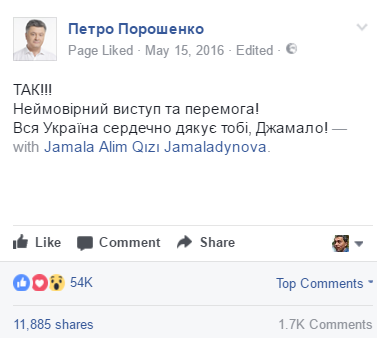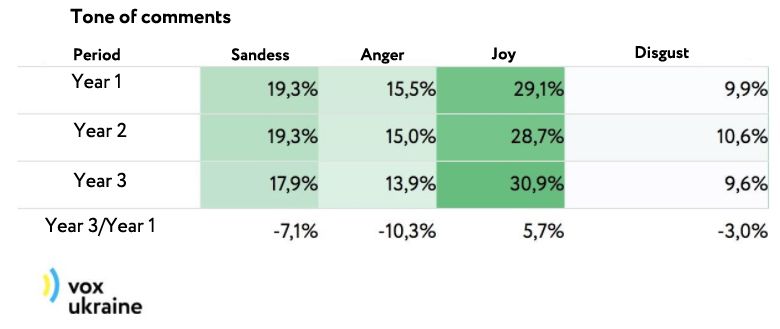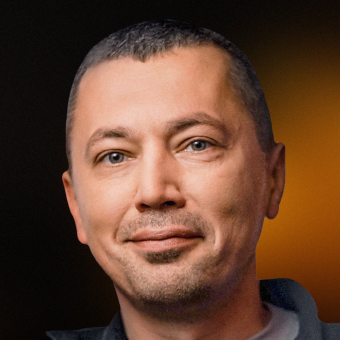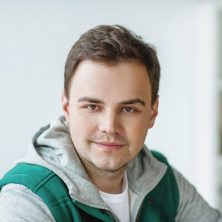At a meeting with the media behind closed doors, President of Ukraine Petro Poroshenko stressed that he tries to look through his Facebook feed every day, and not only from his official account. We might only guess what the President is looking for in the biggest global social network and which conclusions he makes on the materials he reads. However, the technologies of social network analysis along with the neural networks allow us to identify and analyze every word written on the President’s official page, every comment, like, and share. VoxUkraine has received the data from the analytical company TheRespo. What are the big data telling us? A lot. And probably much more than Poroshenko wants to share with more than half a million of his followers.
Three years ago, Petro Poroshenko became president. The event “Elected as President of Ukraine” appeared on his Facebook page that day. This is the starting point of our analysis. Since then, President Poroshenko and/or his communications team has devoted a lot of time and energy to the largest social network. 2,215 posts have been written in the course of three years (as of June 2, 2017), which means that every day an average of roughly two entries have appeared on the President’s page. The readers have left more than 200,000 comments (an average of 93 comments per post), while the total number of likes and shares exceeds 3.9 million and 300,000 respectively. Such activity did not go unnoticed: over the period of his presidency, the number of followers of Poroshenko’s page has exceeded 600,000 people (Mikheil Saakashvili is the only one of the Ukrainian politicians with more followers). But what is hidden behind these statistics?
Before VKontakte and Odnoklassniki were banned in Ukraine, Facebook was not the most popular network in Ukraine, yet certainly the most influential one. Today there are about 8.6 million Ukrainian accounts in Facebook (the number of those maintained by real people is 2-3 times lower). It is in the FB that one can find “live” profiles of most politicians, high-ranking officials, all kinds of experts, journalists, and public activists, and it is this social network that has become a platform for semi-official statements of civil officers and politicians, heated discussions, and various public campaigns. Given this situation, we have decided to choose Facebook for our analysis.
The Story of the Unwritten Posts of the President
Shortly after being elected as president, Petro Poroshenko announced that the posts written by him personally, not by the employees of his press service, would be signed by “P.P.” The times when such posts were frequent are long gone: for example, the last personal post was made in May, the last but one – in February 2017. Nevertheless, the President’s FB is an important source of information, which helps to understand what trends and messages are promoted by the presidential communications team and which topics are “covered up.” More importantly, Facebook analysis provides an opportunity to analyze mass feedback – the opinions and emotions of hundreds of thousands of the President’s followers.
TheRespo company helped us to identify the key words of all the President’s posts, to determine their tone, and to analyze how the issues and ideas promoted by the President have changed over time.
Over the past three years, the President’s Facebook account has undergone a dramatic transformation. The first thing that can be seen with the naked eye is the number of publications. In the first year of the presidency, 751 posts were published, followed by a decline to 577 posts, while in the third year there has been a significant increase in the number of publications – up to 870. At the same time, the statistics of shares and likes proves that the increase in quantity did not lead to the decrease in quality. Each post collected an average of 1,800+ likes and 150 reposts. The only thing that has noticeably deteriorated is the engagement of readers in the discussion: the number of comments under the posts is steadily declining (Table 1).

Trade and occupation instead of war and corruption
The analysis of the word usage dynamics in Petro Poroshenko’s posts over the past three years allows us to identify the issues which became more or less topical for the President.
How We Counted
When assessing the dynamics of posts and comments, we used the ratio of the indicator (the frequency of usage of certain words in the comments or posts, their tone, etc.) of the third year to the first one. In this case, we considered not the absolute indicators, but those weighted by the number and the length of posts and/or comments, i.e. the frequency of word usage in a standard unit of text.
The words which Poroshenko used much less frequently over the past year (June 2016 – June 2017) compared to the first year of his presidency are mostly connected with the war (we took into account lexemes, or sets of root words). The word “posthumous” was used almost ten times less often; “glory” – five times. The mentions of the words “peace”, “country”, and “freedom” have dropped by half. The words “war”, “courage”, and “army” are used in the President’s posts 1.5 times less often. At the same time, the words “soldiers” and “fighters” are used as frequently as before.
The President also tends to appeal less in his posts: “necessary”, “need”, “must”, “have to”, “together”, “we can”, “we will”, “Ukrainians”, “friends” – the number of these words has dropped by 1.5-3 times.
A non-military word “corruption” has demonstrated an unusual tendency: over the third year of his presidency, Poroshenko used it three times less often compared to the first year. Moreover, Poroshenko now writes about the parliament five times less frequently than he used to.
Pic.1. Dropped out

So, which words in the President’s Facebook have replaced the eloquent calls and posts about the war and corruption?
The number of lexemes “trade” has increased by 15 times. “Education” – by almost six times. The President has used the word “discussed” five times more often. In Poroshenko’s Facebook one might track a transition from the militarized Ukraine to the “peaceful” issues.
On the one hand, it is “betrayal”: the war goes on. People die on the frontlines every week or even every day. One gets the impression that the President, not having fulfilled one of his key promises – “to finish the ATO”, is trying not to focus on the topic of war. On the other hand, the President’s Facebook has not stopped talking about the war, although the conflict rhetoric is more and more inclined towards a neutral tone (adopted by the Western diplomats when talking about the war in Ukraine). Thus, the usage of the lexemes “occupation” has increased sevenfold. “Sanctions” and “aggression” are used almost four times more often, “contracts” – three times, “Russia” and “Minsk” – two and a half times. The President started to write twice more often about the Crimea.
It is worth noting that Poroshenko started to “greet” his followers with various holidays and events and “thank them” twice more often.
Pic.2. Broke through

Life Has Become Better, Life Has Become More Joyous
Cutting-edge technologies allow us to analyze not only what was written in the President’s Facebook, but also how it was done – what is the emotional tone of each post. The analysis performed with the help of a neural network has demonstrated an unexpected result: the President’s Facebook is becoming more and more positive with each year – the average content of joy in each post has reached almost 38%, which is the largest share among all the other emotions. The dynamics over the past three years shows that this is a steady trend: there is less and less anger, sorrow, and disgust in the President’s posts with each passing year, while the share of joy is growing rapidly.
How to Read the Emotions Indicator
The emotional tone of one post shows which emotions were used in this particular post. For example, there might be little sadness (5%) and lots of joy (60%). It is usually one emotion, rarely several of them, which prevails in a post. The average shares of each of the emotions in all the posts for a given period are shown below.

Comments for the President
How do readers respond to the creations of the President and his communications team? The analysis of 205,000 comments can provide an answer to this question. The result has also been rather unexpected: a dramatic fivefold decline in trust to the President in offline was accompanied with an increase in the share of positive emotions in the comments online. How is it possible?
The President’s Facebook is a very “lively” place, with an average of 93 comments left below each post. The record was set by the greetings to Jamala on the occasion of her victory at the Eurovision Song Contest, which received 1,700 comments. The same post is a record holder by the number of likes and the runner-up by the number of shares. The reaction to Jamala’s victory is predictable. But what else causes a boisterous public response?

Petro Poroshenko: YES!!! Incredible show and victory! All Ukraine is sincerely grateful to you, Jamala!
A superficial analysis of ten posts with the biggest number of comments shows that the posts with greetings (to the veterans on the eve of the Victory Day, to his wife on the 30th marriage anniversary, to the soldiers in Mariupol, to the President himself on his birthday) and the milestone events for Ukraine (visa-free regime with the EU, ceasefire in Donbas) receive the most feedback.
What do people write? The words used in the comments most frequently are easy to guess. Number one is “Ukraine” followed by “president”, “people”, and “God.” Number nine is “Russia” and number ten – “heroes.”
The tones of comments are much more interesting. The algorithm has yielded an unexpected result: joy is the key emotion in the comments under the President’s posts, while the share of joy in the feedback is gradually growing despite the drop in Petro Poroshenko’s popularity as a politician.

Over the past 12 months, the share of emotion qualified by the neural network as joy has totaled 31%. We see several reasons for that.
- The communication strategy of the President’s presence in social networks is changing – Poroshenko’s Facebook is “migrating” from the important and topical messages to the declarations of good news, reports on achievements, and nice “family” posts. The truth is that the joyful and optimistic posts collect mostly joyful and positive comments. If you look at the top ten posts with the mostly joyful comments (more than 75%), you will see that these are President’s greetings to the Ukrainians on the New Year’s Eve and Christmas, on birthdays (of his wife, of Sviatoslav Vakarchuk, of the President himself). It seems that the President’s communications team has noticed this tendency and learned how to use it. As we have written above, the number of positive posts has also increased significantly: over the first year of presidency, the share of joy in Poroshenko’s posts was only 31%, while during the third year – as much as 38%.
- The second possible reason is not so innocent. The communications team might have started to delete aggressive and negative comments, thereby increasing the share of joy in the posts. Moreover, it cannot be ruled out that a significant share of the joyful comments are left by the so-called bots. Both of these hypotheses need collecting much more data and conducting a deeper analysis. TheRespo team plans to do it within the next two-four weeks.
The Power of Words
We decided to dig even deeper and analyzed which words in the President’s posts provoke particular emotions in the comments. (There might be an error here: the posts with the word “war” can either greet the veterans of the World War II, or talk about the losses in Donbas, which, accordingly, provokes different feelings.) However, this analysis gives a general idea of how the Ukrainians react to different issues and how their attitude is changing.
The first key word we analyzed is “Poroshenko” (it occurs 57 times). The key emotions which can be found in the comments under such posts are anger (14%) and sadness (17%). Joyful comments occur much less often – in only 5% of the cases. However, another thing is of interest here. Having analyzed the dynamics of changes in the tones of the comments in the first and the third years of presidency, we saw a pattern which can hardly be explained away as a mere accident: all negative emotions become more and more rare, while the frequency of joyful comments has increased by 3.4 times (it should be noted that this is a record increase in the emotion of “joy” among all the keywords we analyzed).

The next word we analyzed is “corruption.” It occurs in Poroshenko’s posts 97 times (it is noteworthy that it was used 50 times during the first year of his presidency and only 24 times in the third year). The comments under the posts with this word contain mostly sadness (16%) and anger (13%).
Poroshenko mentions “Russia” 223 times in his FB posts: 62% of them have been published during his third year, which might testify to the President’s desire to shift the attention (at least in Facebook) from domestic problems to external factors. The comments under the posts with the word “Russia” are mostly sad (17%) and angry (14%).
It is natural that the largest share of the joyful responses are published under the posts with the words “congratulations/greetings” (47%), “Oleksandra” (probably about Poroshenko’s daughter – 30%), and “Maryna” (his wife – 27%).
It is less expected, yet very illustrative that the posts with the largest share of sad comments contain the words “government” and “Rada” (17% each).

Bottom line
- Poroshenko’s Facebook is an important communication channel (over 600,000 followers), and the President’s communications team pays much attention to it. Over the past year, more than 870 posts have been published (an average of 2.4 messages per day), which is 1.5 times more than during the second year of his presidency and 16% more than during the first one. Given the average number of likes and shares, it can be concluded that the quantity did not impact the quality.
- The topics and the tones of the posts have changed over the past three years. Poroshenko is writing less about the war (some “military” words occur 10 times less often). The conflict rhetoric has become much more neutral.
- Corruption is barely mentioned in Poroshenko’s Facebook page: during the third year of his presidency this word has been used three times less often than during the first one. At the same time, there are twice as many posts with greetings and acknowledgements.
- The President’s Facebook is becoming happier and more positive. The share of joy in his posts had increased from 31% to 38%.
- Each of 2,215 Poroshenko’s posts received an average of 93 comments. Unexpectedly, joy has turned out to be the most popular emotion in the comments. Even more surprising is the fact that the share of joy in the feedback keeps increasing with every passing year, although not very significantly (from 29.1% to 30.8%).
- The posts with the words “congratulations/greetings” (47%), as well as those about the family (about 30%) receive the biggest number of positive comments. The posts with the words “Poroshenko”, “corruption”, “Russia”, “Rada”, and “government” receive the most negative feedback.
Photo credit: Petro Poroshenko’s Facebook page
VoxUkraine is grateful to Volodymyr Lozovyi, CEO of TheRespo, for his contribution to this article.
Attention
The authors do not work for, consult to, own shares in or receive funding from any company or organization that would benefit from this article, and have no relevant affiliations





